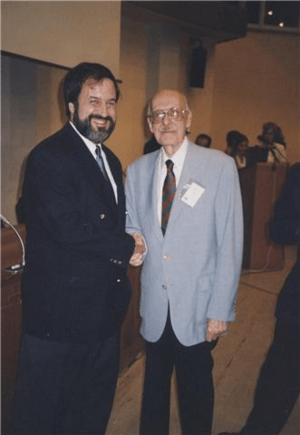Angelo DiGeorge facts for kids
Quick facts for kids
Angelo Mario DiGeorge
|
|
|---|---|

DiGeorge (right) in 2002
|
|
| Born | April 15, 1921 Philadelphia, Pennsylvania, U.S.
|
| Died | October 11, 2009 (aged 88) Philadelphia, Pennsylvania, U.S.
|
| Alma mater | Temple University |
| Occupation | Pediatric Endocrinologist |
| Years active | 1946–1989 |
| Employer | Temple University School of Medicine |
| Known for | Discovery of DiGeorge syndrome |
| Title | President, Lawson Wilkins Pediatric Endocrine Society |
| Term | 1983–1984 |
Angelo Mario DiGeorge (born April 15, 1921 – died October 11, 2009) was an American doctor. He was a special kind of children's doctor called a pediatric endocrinologist. Dr. DiGeorge was from Philadelphia. He is famous for discovering a health problem now called DiGeorge syndrome. This problem affects how the body's defense system works.
Contents
Early Life and Education
Angelo DiGeorge was born in South Philadelphia on April 15, 1921. His parents, Antonio and Emilia DiGiorgio, were immigrants from Italy. When he was in primary school, his teacher changed his last name from DiGiorgio to DiGeorge.
He was a very smart student. In 1939, he graduated at the top of his class from South Philadelphia High School for Boys. He then received a special scholarship to attend Temple University. He studied chemistry and graduated with honors in 1943.
Dr. DiGeorge continued his studies at Temple University School of Medicine. He earned his medical degree with honors in 1946. After medical school, he worked at Temple University Hospital. From 1947 to 1949, he served in the U.S. Army in Austria. He was a captain and led the Medical Service at a hospital there.
When he came back to Philadelphia, he met Natalie Picarello. She was a nurse at Temple Hospital, and they later got married. He finished his training to become a children's doctor at St. Christopher's Hospital for Children. He also did special training in endocrinology at Jefferson Medical College in 1954.
His Career and Discoveries
In 1952, Dr. DiGeorge joined the Department of Pediatrics at Temple University School of Medicine. He became a full professor in 1967. He also worked at St. Christopher's Hospital for Children. There, he led the department for hormones and metabolism from 1961 to 1989.
He was a founding member and president of the Lawson-Wilkins Pediatric Endocrine Society. This is a group for doctors who specialize in children's hormones. For over 40 years, he wrote the chapter on hormones for the Nelson Textbook of Pediatrics. This book is very important for children's doctors worldwide.
What is DiGeorge Syndrome?
Dr. DiGeorge became known around the world in the mid-1960s. This was because of his important discovery of a new health condition. This condition is now called DiGeorge syndrome. It is a problem that babies are born with. It means a small gland called the thymus is missing or not fully formed. The thymus helps the body fight off sickness.
This syndrome can also cause other health issues. These include problems with the parathyroid glands (which control calcium). It can also cause heart defects and a certain look to the face. Sometimes it's called Velocardiofacial syndrome or chromosome 22q11.2 deletion syndrome. This is because most people with the condition are missing a tiny piece of chromosome 22.
DiGeorge syndrome is one of the most common genetic disorders. It affects about 1 in every 4,000 babies born. Dr. DiGeorge's first report about this condition in 1965 was very important. It is still often mentioned by doctors and scientists today.
A Kind Doctor and Teacher
People described Dr. DiGeorge as a very caring doctor. He always looked at the patient as a whole person. He was excellent at figuring out what was wrong with patients. He was also a great teacher and a wonderful speaker. He loved to tell stories and was a keen observer.
Outside of medicine, he had many hobbies. He enjoyed gardening, performing arts, and stamp collecting. He also loved politics and Philadelphia sports, especially the Philadelphia Phillies baseball team. He loved everything about Philadelphia and his Italian heritage.
He enjoyed debating different topics, from sports to politics. He would have lively discussions with his colleagues and family. Dr. DiGeorge was often invited to medical meetings in Italy. In 2002, he met Bob Shprintzen in Rome. They had both been working on the same syndrome for a long time.
Later Life and Passing
Dr. DiGeorge passed away on October 11, 2009. He was 88 years old. He died from kidney failure at his home in East Falls, Philadelphia.
See also
 In Spanish: Angelo DiGeorge para niños
In Spanish: Angelo DiGeorge para niños
 | Leon Lynch |
 | Milton P. Webster |
 | Ferdinand Smith |

